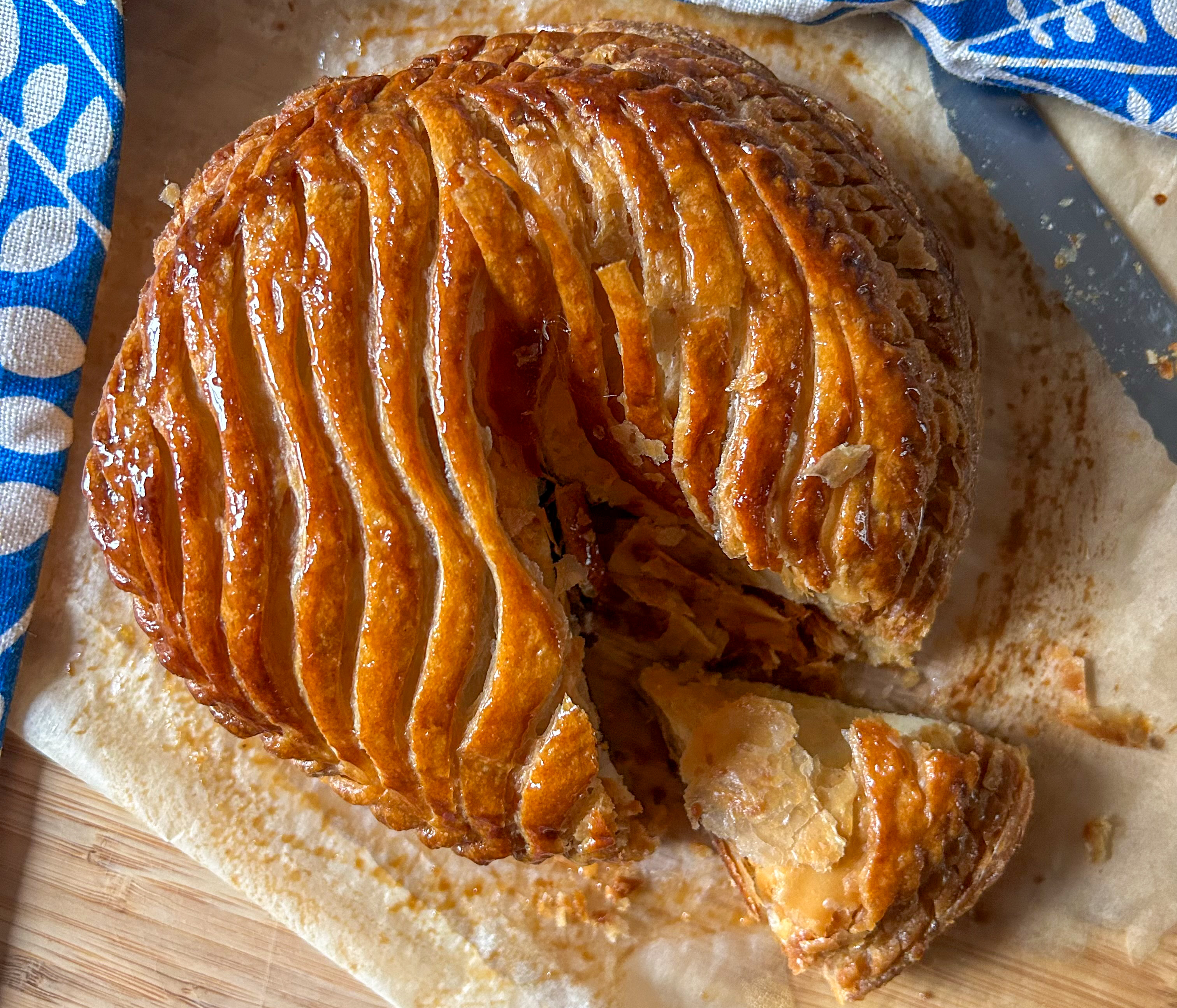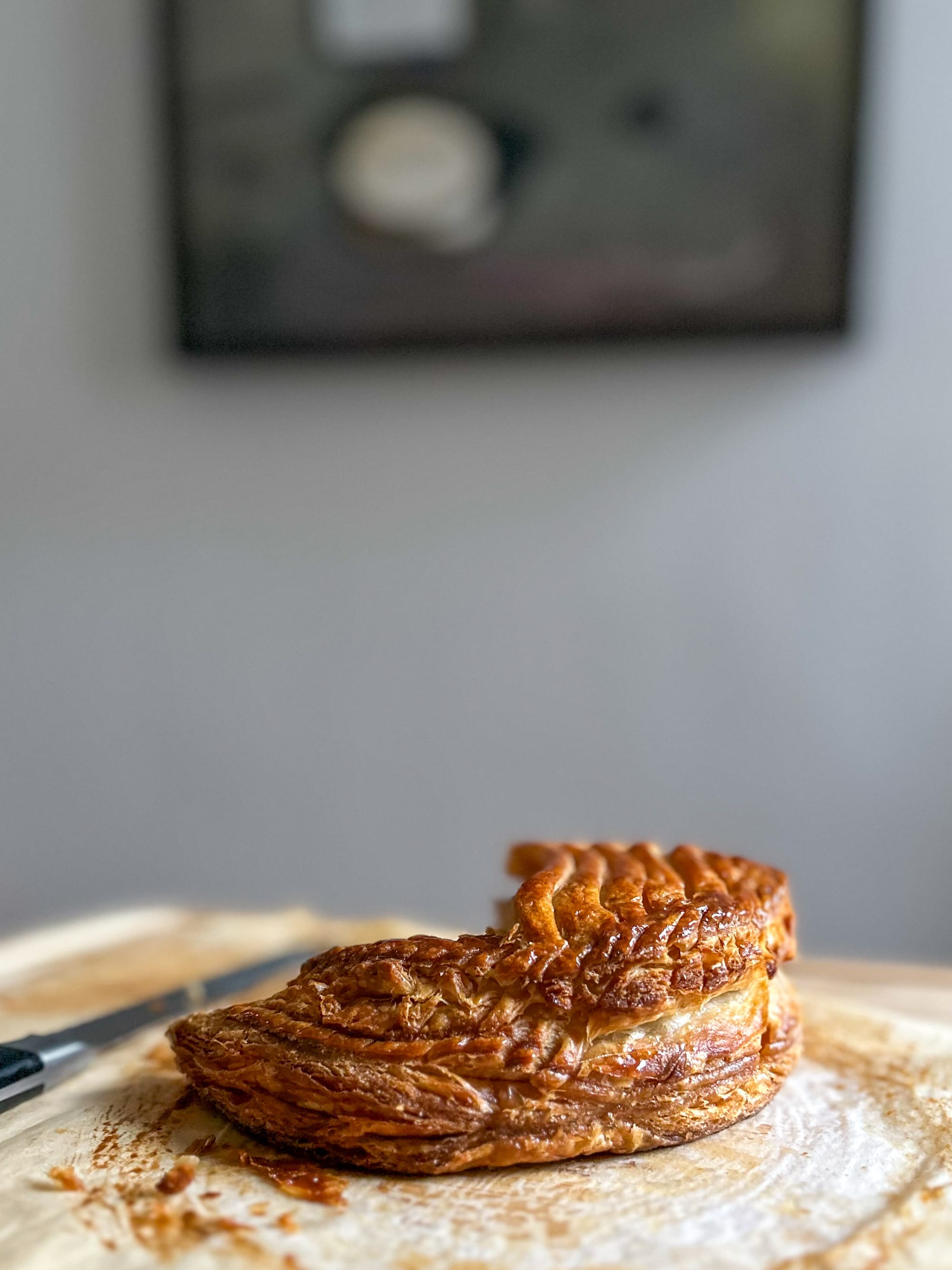
Finding Royalty in the Oven
I’ve made galette des rois every year since moving to London. Last year, I filled it with a dense Nutella frangipane. The year before, my first year in London, I made a traditional one, of which there is no photographic evidence apart from some scribbles in my notebook. I made it blindly, with no deeper research of why it exists and why it’s so popular. The goal was a self-aggrandising one—making puff pastry makes me feel like a bad bitch, so I'm gonna make it. And at the start of the year, where resolutions run high and anxieties to uphold them even higher, I needed that feeling.
Puff pastry is crazy. How can three ingredients turn into the flakiest thing in all the land? How did humans figure this out? For all the atrocities that humans do, there is no denying that when it comes to puff pastry, we really ate.
Also intriguing is the legend of the galette des rois. Originating in the 14th century, it was baked to celebrate the Epiphany, the feast where the three kings came through to see baby Jesus for the first time. Some sites alter the story slightly, saying that the galette was made to sweeten the deal for the kings to even go to Bethlehem in the first place. Putting puff pastry on the same level as the son of God is a wild turn of events, and while we’ll never know for sure, I take solace in knowing that there is a multiverse in which that could be true.
But I grew up in America, where religion is fraught and possibly why the galette des rois never made it over (it’s definitely not from a disdain of laminated dough, given how much we love croissants). Galettes des rois are based on religion, one that isn’t mine and I have little familiarity with. So I wonder—am I even allowed make this? What is the line between religion and its food?

To find an answer, I took two paths—exploring the galette’s role in religion today, and doing an empathy exercise on how I would feel if a non-Hindu person were to make a Hindu festival dessert.
Across religions, desserts have long been linked to holidays. Baklava in Greece, pumpkin pie in America, and of course, the galette des rois. While some foods continue their staunch association (like matzo on Passover), many have become less about religion and more about celebration and abundance. Desserts are uplifting and fun, a throwback to childhood bliss and abandon. The galette des rois, while founded to honour the three kings, has evolved to allow anyone to be a king or queen. Today’s galettes have a féve hidden inside them—a small object waiting to be revealed by a lucky person who finds it in their slice. Whoever finds it becomes crowned king or queen of the day, and everyone must treat them like royalty.
The galette further diverged from religion during the French Revolution, where the left renamed it to galette de l'égalité—cake of equality. But even though King Louis XVI was executed and the monarchy effectively disbanded, as one site notes, “[t]hese changes were of course temporary.” Unlike Louis XVI, when it comes to this galette, once a king, always a king.
In Hinduism, most desserts are eaten not in association with any one religious occasion but to celebrate any auspicious occasion—weddings, childbirth, new year, etc. There are gulab jamuns, laddoos, kheer, and many more, all of which I love. People rarely make them at home, opting instead to buy them at specialty mithai (sweet) shops by the box. A non-Hindu making mithai would feel odd simply because most Hindus don’t make them. The same goes for consumption—a non-Hindu eating mithai on a casual Thursday afternoon feels odd because outside of the week after Diwali when I’m inundated with leftover mithai boxes, I wouldn’t do that. Mithai has a purpose—to celebrate moments, religious or not.
There is no religious association for galette des rois for me. As its place (and briefly even its name) in the world has changed, it seems to be a token for something even larger than religion, if that's even possible. It is a celebration for the royalty in all of us and a celebration that humans really went pedal to the metal when they came up with puff pastry. More personally, it's a celebration that making puff that rises as high as mine does is a flex, and I really am a bad bitch for that.
P.S. I'm back after a looong hiatus. Thanks for being patient with me.

